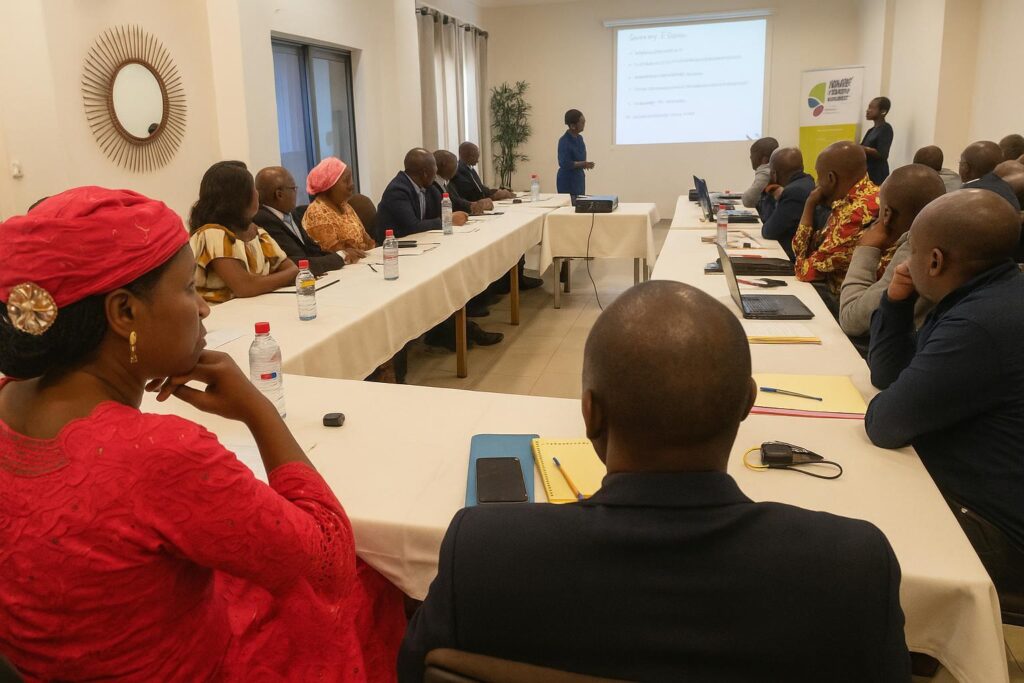Un atelier stratégique à Brazzaville
On 29 August, the Centre d’action pour le développement organised capacity-building workshop for municipal and departmental councillors from across the Republic of Congo, under the UN Democracy Fund-backed project supporting local governance. The venue, a modest hall in downtown Brazzaville, buzzed with determined conversations.
Participants travelled from Impfondo, Dolisie, Ewo and Pointe-Noire, often after night-long road journeys. Many confided that such a cross-regional dialogue was a first. “Nous venons apprendre et partager”, soulignait Pierre-Yves Mabiala, conseiller municipal de Makoua, visiblement impatient de confronter sa pratique aux nouvelles exigences.
The agenda focused on democratic governance, human rights and local management. Trainers alternated presentations with case studies, keeping the tone pragmatic. According to programme officer Guerschom Gobouang, the ambition is to “outiller les élus afin qu’ils deviennent de vrais catalyseurs d’inclusion dans leurs circonscriptions”.
Objectifs et attentes des participants
Beyond theoretical reminders, facilitators encouraged each councillor to map the concrete needs of their community. Worksheets listed water access, health posts, youth employment and waste management. The idea, explain organisers, is to link every promise with measurable indicators and a realistic funding line.
Several elected officials admitted that budgetary procedures still feel abstract. Léonie Ngoma, conseillère départementale de Sibiti, évoque un manque de formation initiale : “Nous gérons des chiffres, pas seulement des fêtes locales. Comprendre un compte administratif nous aidera à mieux défendre nos projets devant les partenaires.”
Trainers responded with simplified budget templates and role-play sessions. One exercise simulated a council debate on rehabilitating a rural track without waiting for central subsidies; participants negotiated co-financing through diaspora associations and micro-levies on local markets, illustrating new avenues unlocked by the 2017 decentralisation code.
Intégrer les droits humains aux politiques locales
The workshop placed particular emphasis on a rights-based approach. Instead of viewing citizens as mere beneficiaries, councillors were urged to see them as holders of enforceable rights. That shift, noted legal expert Clarisse Tchissambou, “renforce la légitimité des conseils et rapproche l’administration des aspirations réelles”.
Practical sessions reviewed national and international texts, from the 2015 Constitution to the African Charter on Democracy. Participants drafted mock municipal bylaws ensuring access to civil status documents for students seeking scholarships, demonstrating how human rights language can translate into concrete administrative measures.
The debate occasionally touched sensitive points, such as land disputes or youth representation. Facilitators reminded everyone that inclusivity strengthens stability. By the end, each delegation appointed a focal person to relay human-rights alerts to CAD and to maintain the dialogue platform opened during the seminar.
Innovation dans le financement des collectivités
One recurring obstacle raised by councillors is financial dependency on state transfers. Trainers presented alternative channels, including public-private partnerships and village savings groups. They highlighted recent success in Owando, where a street-lighting project mixed municipal funds, a cocoa exporter’s donation and youth volunteer labour.
Participants also discovered crowdfunding platforms tailored to African municipalities. The digital demonstration showed how transparent dashboards can reassure diaspora donors. “La confiance suit la visibilité”, estimait l’ingénieur Serge Ossété, qui accompagne déjà trois quartiers de Brazzaville dans la collecte en ligne pour des points d’eau potable.
Nevertheless, organisers stressed that innovative finance must respect national regulations. A representative of the Ministry of Territorial Administration clarified approval procedures for external grants, insisting on accountability mechanisms to prevent misuse and strengthen public trust in decentralisation.
Perspectives pour la jeunesse et la démocratie participative
Many young adults present, some elected before turning thirty, see decentralisation as an opportunity to re-enchant politics. They argued for regular town-hall meetings live-streamed on social media, a format already tested in Oyo, generating vibrant feedback loops between councillors and an increasingly connected electorate.
According to youth activist Brice Ngobo, enhancing participation also requires simplified language. “Nous devons rompre avec les termes techniques inaccessibles. Une infographie vaut parfois un long rapport.” The workshop ended with a commitment to produce quarterly visual bulletins summarising council decisions in French and Kituba.
CAD plans to accompany the cohorts over twelve months through field visits and an online forum. Progress will be measured by the number of community consultations organised and the rate of implementation of identified micro-projects, offering a tangible yardstick for the workshop’s impact.
If the momentum holds, organisers believe local councils could become laboratories of participatory democracy aligned with the national agenda. For the young elected officials, the real test will come back home, in sometimes isolated districts, where expectations are high and resources remain scarce but creativity abounds.
Renforcement du réseau des élus
During the closing ceremony, participants exchanged telephone contacts and created a WhatsApp group baptised “Conseils Dynamiques 242”. The platform will serve to share draft bylaws, alert peers about funding windows and circulate minutes of meetings, fostering a peer-to-peer coaching culture.
CAD coordinators welcomed the initiative, promising technical moderation and monthly webinars with subject-matter experts. They argue that horizontal networking can complement formal training, shorten response times during emergencies and gradually weave a nationwide fabric of proactive, accountable local leadership.

